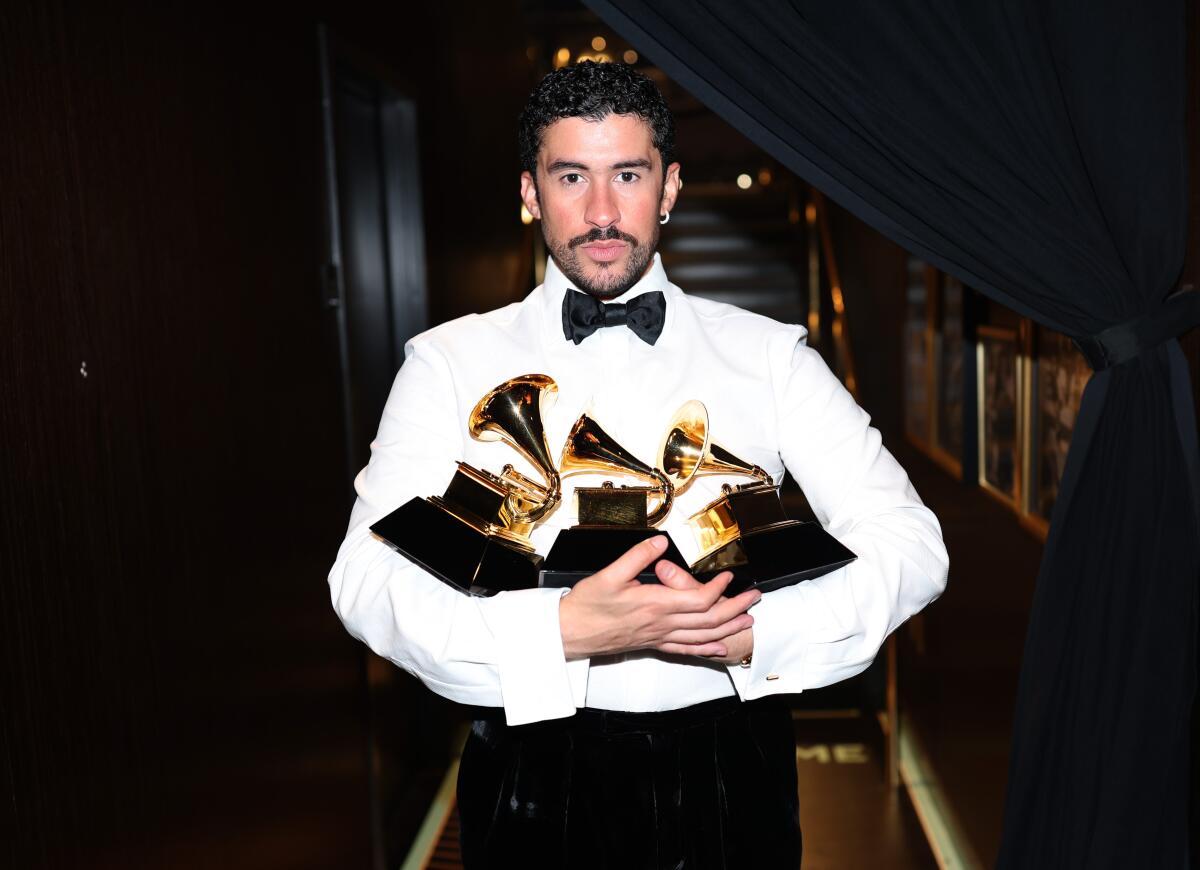Bad Bunny is American; Coldplay is not. Still, MAGA flips out
President Trump told the New York Post that music artist Bad Bunny was a “terrible choice” to headline the 2026 Super Bowl halftime show and that the NFL’s selection of the Puerto Rican singer and rapper sows “hatred.”
Department of Homeland Security adviser Corey Lewandowski suggested that Bad Bunny loathes the U.S. “It’s so shameful that they’ve decided to pick somebody who just seems to hate America so much to represent them at the halftime game,” he told conservative podcaster Benny Johnson.
Sen. Tommy Tuberville (R-Ala.) said on Monday that Bad Bunny disseminates “anti-American propaganda.”
The upshot: Bad Bunny (aka Benito Antonio Martínez Ocasio) is an enemy of the state. An outsider who doesn’t possess American values. A Super Bowl wrecker.

Bad Bunny took home multiple trophies from the 68th Grammy Awards last weekend in Los Angeles, including for album of the year. Very American, sir.
(Matt Winkelmeyer / Getty Images for the Recording Academy)
Heated debate around who is worthy to perform the halftime show is an American tradition (Prince, yes. The Red Hot Chili Peppers, no). But now, unsurprisingly, politics are part of that debate, so the mere fact that Bad Bunny is brown and Latino and sings in Spanish is seen by some as an affront to the right. Clearly the “Woke Bowl” is disrespecting the tough-on-immigration president, and in Español, no less.
But Bad Bunny is an American citizen, as are most people born in Puerto Rico after 1898, thanks to the Jones-Shafroth Act of 1917. Bad Bunny, born in 1994, made the deadline with 96 years to spare. If the fear is that foreigners are coming here to take our jobs and ruin beloved American traditions, there are plenty of nonnative artists to grouse about.
For decades, outsiders have foisted their foreign music upon us at the Super Bowl between commercials for Doritos and Budweiser.
The United Kingdom’s Phil Collins played the 2000 Super Bowl XXXIV Halftime Show, as did Enrique Iglesias, who is from Spain. The Irishmen of U2 stole jobs away from Americans when they played the 2002 Super Bowl. The following year it was sneaky Canadian Shania Twain and a sus character from England referred to only as Sting.
Then came bad hombre after bad hombre from the UK: Paul McCartney, the Rolling Stones, the Who, Coldplay. And don’t even get me started on Shakira, gyrating her Colombian self into 2020’s Super Bowl LIV Halftime Show, or the following year, the Weeknd using his sweet voice to distract from the fact he’s Canadian.
Remember all the anti-immigrant furor around those aforementioned performances? Of course not — because there was none. And this year, if the delicately reunited U.K. duo Oasis was to pull things together for 2026 and play the Super Bowl, it most certainly wouldn’t inspire the same kind of vitriol.
The right remembers that Bad Bunny criticized the Trump administration for its handling of Puerto Rico’s hurricane recovery, and that that he has spoken out against ICE’s inhumane treatment of immigrants. But calling Bad Bunny a dissenter is too direct, too Stalinist. It’s better to cast doubt upon the singer’s loyalty to America via thinly veiled racist rhetoric.
Turning Point USA, the right-wing group founded by Charlie Kirk and helmed by his wife, Erika Kirk, following his assassination, has organized its own counter-concert called the “All-American Halftime Show”. It will star rap-rocker Kid Rock and country artists Brantley Gilbert, Lee Brice and Gabby Barrett. The show is counter-programmed to compete with the Super Bowl halftime show, airing on X and conservative networks such as TBN and OAN around the same time as Bad Bunny’s set.
When the “alternative” show’s lineup was announced this week, Kid Rock took a jab at Bad Bunny in a statement: “He’s said he’s having a dance party, wearing a dress, and singing in Spanish? Cool. We plan to play great songs for folks who love America.”
Kid Rock isn’t known to wear dresses on stage, as Bad Bunny has done, but it’s unclear which songs of his he’ll play in the name of “loving America.”
Turning Point spokesman Andrew Kolvet said the show will reflect conservative values such as “faith, family, and freedom,” so Kid Rock likely won’t perform his 2001 track “Cool, Daddy Cool,” where he sings “Young ladies, young ladies, I like ‘em underage see / Some say that’s statutory, but I say it’s mandatory.” It’s also unlikely he’ll bust out his 2007 song “Lowlife (Living the Highlife)”: “I make Black music for the white man / Keep cocaine upon my nightstand.”
One thing is certain: He’ll continue to sing Trump’s praises, in English.
